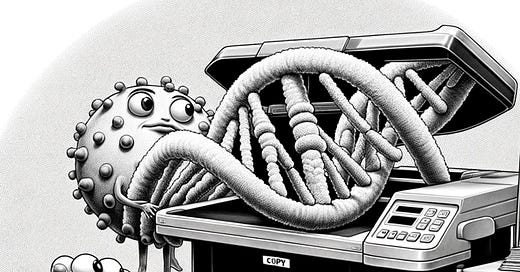The Daily Pill is a series of very short daily posts where I share the definition of a medical term I think we should all know. Read it every morning and build up your medical vocabulary.
🧬Telomere
Telomeres are the protective caps at the ends of chromosomes. Every time a cell divides, it first need to make a copy of its own DNA (one copy for each resulting new cell), the problem is that every time DNA replicates, a little bit of telomere is lost in the copying process because the copying machine doesn’t really reach all the way to the end of the DNA. This is why telomeres are considered protective caps, like a buffer zone… without telomeres we would lose actual DNA with each cell division, and that would just be poor form.
⏳Anyway, as telomeres shorten more and more with each cell replication as we get older, their shortening contributes to cell aging and eventually death. Its like we come with our very own molecular expiration date.
🤔Why you need to know:
In the context of human longevity and wellness, maintaining telomere length is crucial as shortened telomeres are associated with aging and various age-related diseases. As you can imagine, research in this field is very hot these days.
For example, a study highlighted by the UC San Francisco reported that lifestyle changes—including diet, exercise, and stress management—might lead to longer telomeres. These findings suggest that such interventions could potentially influence aging and wellness at a cellular level. I give you the study:
Effect of comprehensive lifestyle changes on telomerase activity and telomere length in men with biopsy-proven low-risk prostate cancer: 5-year follow-up of a descriptive pilot study Lancet Oncol. 2013 Oct;14(11):1112-1120. doi: 10.1016/S1470-2045(13)70366-8. Epub 2013 Sep 17. PMID: 24051140.
In terms of exercise, specifically, other studies have differentiated the effects of various types of physical activity on telomere length. Aerobic endurance training and high-intensity interval training (HIIT) have been particularly noted for their positive impact on telomere length (Of course it had to be HIIT…FML). These types of exercise have been shown to offer protective and longevity benefits at the cellular level, unlike resistance training, which did not show the same effects in the context of telomere biology. I present to you, the study:
Differential effects of endurance, interval, and resistance training on telomerase activity and telomere length in a randomized, controlled study, European Heart Journal, Volume 40, Issue 1, 01 January 2019, Pages 34–46, https://doi.org/10.1093/eurheartj/ehy585
🧠Trivia:
Studies on astronauts have shown that telomeres can become significantly longer in space. However, these changes are temporary; telomeres tend to shorten rapidly once back on Earth. So you know, just don’t come back to earth and we are good.






